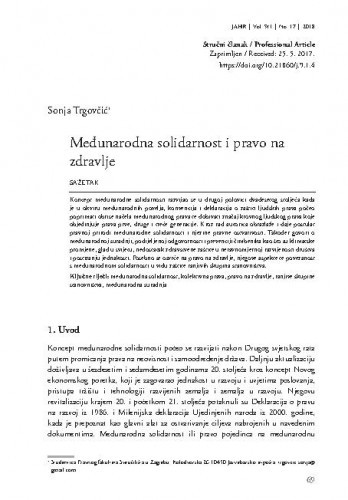Koncept međunarodne solidarnosti razvijao se u drugoj polovici dvadesetog stoljeća kada je u okviru međunarodnih povelja, konvencija i deklaracija o zaštiti ljudskih prava počeo poprimati obrise načela međunarodnog prava te dobivati značaj krovnog ljudskog prava koje objedinjuje prava prve, druge i treće generacije. Kroz rad autorica obrazlaže i daje postulat pravnoj prirodi međunarodne solidarnosti i njezine pravne ostvarivosti. Također govori o međunarodnoj suradnji, podijeljenoj odgovornosti i prevenciji čimbenika kao što su klimatske promjene, glad u svijetu, nedostatak zdravstvene zaštite u neravnomjernoj razvijenosti društva i postizanju jednakosti. Posebno se osvrće na pravo na zdravlje, njegove aspekte te povezanost s međunarodnom solidarnosti u vidu zaštite ranjivih skupina stanovništva.; The concept of international solidarity has been developing since the second half of the 20th century within the scope of international charters, conventions and declarations of protection of human rights. It has earned the qualities of the principle of international law and has been given a meaning of the key human right which binds together human rights of the first, second and third generation. With this work the author provides an explanation and gives a postulate to the legal nature of international solidarity and its legal feasibility. Furthermore, the author speaks about international cooperation, shared responsibility and the prevention of factors of climate change, hunger, inadequate health care, polarity in the economic development, and achieving equality. The author dedicates special attention to the right to health, its aspects and connections with international solidarity in protection of vulnerable groups.
Sažetak

 JAHR : europski časopis za bioetiku = European journal of bioethics : 9,17(2018) / glavni urednik, editor-in-chief Igor Eterović.
JAHR : europski časopis za bioetiku = European journal of bioethics : 9,17(2018) / glavni urednik, editor-in-chief Igor Eterović.